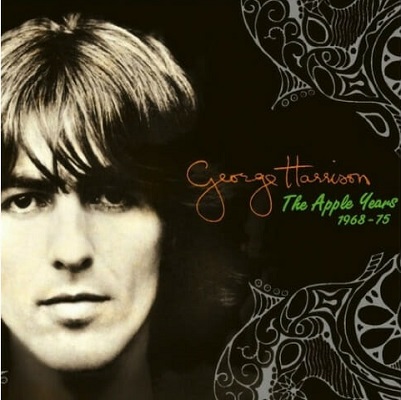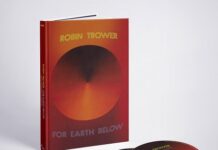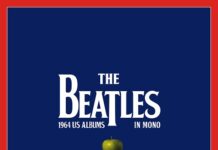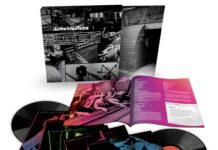As a solo artist, George Harrison certainly had his ups and downs, hits and misses, peaks and valleys. Overshadowed by fellow Beatles John Lennon and Paul McCartney, the guitarist’s creative juices were bursting toward the end of the 60s, culminating with the release of a first solo album from one of the Fabs — Wonderland Music — on the newly minted Apple Records. Harrison’s songwriting had also matured and blossomed, resulting in Beatles classics like “While My Guitar Gently Weeps,” “Here Comes The Sun” and “Something.” Once the group disbanded, an avalanche of songs came tumbling out on the three-LP opus All Things Must Pass — released in late 1970. Harrison would go on to issue three more for Apple. Moving forward to where The Dark Horse Years 1976-1992 left off, The Apple Years 1968-75 is an eight-disc box set that starts from the very beginning of Harrison’s solo work with remastered discs of — complete with bonus tracks on each — Wonderwall Music (1968), Electronic Sound (1969), All Things Must Pass (1970), Living In The Material World (1973), Dark Horse (1974) and Extra Texture (1975). The box set also includes a DVD.
Released in late 1968, Wonderwall Music is an eclectic soundtrack for the film of the same name, effectively a scatterbrain playground for Harrison’s pent-up ideas. A mishmash of incidental passages, scads of sitar, sarod and tabla, Dixieland cutaways, “Cowboy Music,” church bells, chirps, acoustic guitar, space rock riffs, piano, horns — you name it and he threw it in. Listening to it nowadays is nothing less than sheer delight. An alternate take of “The Inner Light,” from the same session and with the same players that appear on the Beatles’ version, is a lovely addition.
Electronic Sound is a little more difficult to nail down. Originally issued in 1969 as one of only two releases on the Zapple label, an experimental offshoot of Apple (the other Zapple title was John Lennon and Yoko Ono’s Unfinished Music No.2: Life with the Lions), Electronic Sound comprises two tracks of Harrison and electronic musicians Rupert and Jostick, the Siamese Twins and Bernie Krause, creating sound soundscapes with Moog synthesizers. Though it’s not exactly something you’ll be spinning at your next cocktail party, it does conjure illusions far beyond the realm of this planet or any other. Reportedly, the same Moog that Harrison used, was latter used on the Beatles’ Abbey Road.
The centerpiece of The Apple Years 1968-75 are the two discs of All Things Must Pass. Unlike most anything else in Harrison’s catalog, this is an album that has aged like a fine wine, sounding better and fuller, more realized and cohesive with each successive playback. Harrison with friends Eric Clapton, Ringo Starr, Dave Mason, Gary Brooker, Billy Preston, Klaus Voorman and many more provided a huge sound; Phil Spector’s dense wall of reverb enveloping the mix with an enchanting air of ambience. Tracks like “My Sweet Lord,” “Wah-Wah,” “What Is Life,” “Isn’t It A Pity,” “Beware Of Darkness” and the title track skim the surface of what Harrison had been stockpiling since the days of the Beatles. The track listing, including bonus tracks — the “I Live For You” outtake, a backing track of “What Is Life,” and “My Sweet Lord (2000),” a remake that happened to become one of Harrison’s final recordings – resembles the January 2001 reissue that commemorated the album’s 30th anniversary.
Living In The Material World, the 1973 follow-up, is more restrained and immediate without the wall of sound whitewash of its predecessor, but its flow and elegance are unmistakable. It would go on to become, while “Give Me Love (Give Me Peace On Earth),” the album’s leadoff track, was his second Number One single. Many of the same musicians who appeared on All Things Must Pass also played on Living In The Material World. Harrison’s signature slide is all over the record, including his second Number One hit, “Give Me Love (Give Me Peace On Earth),” as well as on “Sue Me, Sue You Blues,” an acerbic diatribe regarding the litigation headaches that came with “My Sweet Lord.” Bonus tracks that also appeared on 2006 reissue include “Deep Blue” (a 1971 B-side to “Bangla Desh”), “Miss O’Dell” (another B-side), and the single edit of “Bangla Desh.”
Coming at the end of 1974, Dark Horse marked a busy time in Harrison’s career. He established his own Dark Horse label, built a home recording studio, and mounted his one and only tour of North America. While the album was warmly greeted, it didn’t exactly burn up the charts. The tour that followed failed to help, especially in lieu of Harrison’s vocal issues, which may or may not be attributed to his drinking and drugging ways at the time, along with a crumbling marriage to Patti Boyd. Indeed, the pain is spelled out in the woeful “Simply Shady.” It might even be more obvious in the ruefully poignant “So Sad,” which Harrison had originally given to Alvin Lee to record with Mylon LeFevre for the On The Road To Freedom album. Here, the song overflows with a flavor simple and sincere beauty of which Harrison was known for. “Ding Dong, Ding Dong” is a little more hopeful, while the title track with Harrison’s scratchy vocal assumes a special personality all its own. The “Dark Horse” song was released as the a lbum’s lead single, barely crawling inside the Top 20. It’s B-side, “I Don’t Care Anymore,” makes its CD debut on the 2014 reissue. A previously unreleased acoustic take of “Dark Horse,” which sounds much brighter with the vocal harmonies, rounds out the package.
The final release of the Apple years, 1975’s Extra Texture (Read All About It) is marked by Harrison’s attitude at the end of the Dark Horse tour, a return to form in some ways, yet also an explicit transition, provoked by this album being his last for Apple, and the new associations he would make to embark on other creative ventures. The single “You” used backing tracks from 1971 that were originally recorded for an unreleased version by Ronnie Spector. Here, it sounds different and out of sync with the mood of the rest of the album. Surprisingly, the 2014 remaster reveals a creative and introspective album that’s aged well. “This Guitar (Can’t Keep From Crying),” an ambiguous “sequel” to “While My Guitar Gently Weeps” is one of his most overshadowed songs. A version Harrison re-recorded in 1992 with Dave Stewart, and enhanced with more recent overdubs by Ringo Starr on drums, Dhani Harrison on guitar, and vocalist Kara DioGuardi, is one of the reissue’s bonus tracks. Elsewhere, another highlight is “Grey Cloudy Sky,” a song that, despite its solemn, down-trodden lyrics, resonates with a level of reflection that somehow makes you feel everything is going to be OK. Maybe following up with the upbeat “His Name Is Legs” was a sign that better days were certainly ahead.
The Apple Years 1968-75 is topped off by an exclusive DVD filled with various music videos, including a new seven-minute film with previously unreleased footage. There’s also a book with an introduction by Dhani Harrison, new essays by Kevin Howlett, and a bunch of previously unpublished photos. It’s difficult to say how successful George Harrison’s career was after the Beatles broke up, but you can certainly argue that The Apple Years 1968-75 features his best, strongest efforts to step out from the shadow of a legacy that would trail him for the rest of his days.
~ Shawn Perry




















